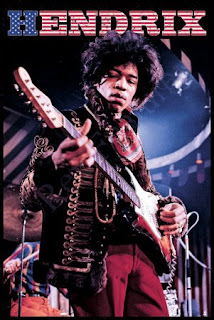
Hendrix was born on November, 1942, in Seattle, Washington, USA, while his father was in army camp in Oklahoma. He was named Johnny Allen Hendrix at birth by his mother, 17 year old Lucille Hendrix née Jeter. She had put him in the temporary care of friends. On his release from the army his father, James Allen "Al" Hendrix (1919–2002), retrieved him and re-named him James Marshall Hendrix in memory of his deceased brother, Leon Marshall Hendrix. He was known as "Buster" to friends and family, from birth. Shortly after, Al reunited with Lucille. Al found it hard to gain steady employment after the Second World War, and the family experienced financial hardship. Hendrix had two brothers, Leon and Joseph, and two sisters, Kathy and Pamela. Joseph was born with physical difficulties and at the age of three was given up to state care. His two sisters were both given up at a relatively early age, for care and later adoption, Kathy was born blind and Pamela had some lesser physical difficulties. Hendrix's parents divorced when he was nine years old, and his mother died in 1958. On occasion, he was sent to live with his grandmother in Vancouver, British Columbia because of his unstable household, and his brother Leon was put into temporary welfare care for a period. Hendrix grew up as a shy and sensitive boy, deeply affected by the conditions of poverty and neglect that he was raised in. In a relatively unusual experience for African Americans of his era, Hendrix' high school had a relatively equitable ethnic mix of African, European (including Jews) and Asian (Japanese, Filipino and Chinese) Americans. At age 15, around the time his mother died, he acquired his first acoustic guitar for $5 from an acquaintance by hellos beginner. This guitar would replace both the broom handle he would thrum in imitation and the one-stringed ukulele his father had found while cleaning out a garage, on which Jimi reportedly managed to play several tunes. He learned by practicing almost constantly, watching others play, through tips from more experienced players and listening to records. In the summer of 1959, his father bought Hendrix a white Supro Ozark, his first electric guitar, but without an amplifier. That same year his only failing grade in school was an F in music class. According to fellow Seattle bandmates, he learned most of his acrobatic stage moves—a major part of the blues/R&B tradition—including playing with his teeth and behind his back, from a local youth, Raleigh "Butch" Snipes, guitarist with local band The Sharps, and also performed the "duck walk" of Chuck Berry. He played in a couple of local bands, occasionally playing outlying gigs in Washington state and at least once over the border in Vancouver, British Columbia.
Hendrix got into trouble with the law twice for riding in a stolen car. He was given a choice between spending two years in prison or joining the army. Hendrix chose the latter and enlisted on May 31, 1961. After completing boot camp, he was assigned to the 101st Airborne Division and stationed in Fort Campbell, Kentucky. His commanding officers and fellow soldiers considered him to be a sub-par soldier: he slept while on duty, had little regard for regulations, required constant supervision, and showed no skill as a marksman. For these reasons, his commanding officers submitted a request that Hendrix be discharged from the military after he had served only one year. Hendrix did not object as the opportunity arose to do so. Hendrix would later tell reporters that he received a medical discharge after breaking his ankle during his 26th parachute jump. The 2005 biography Room Full of Mirrors by Charles Cross claims that Hendrix faked being homosexual—claiming to have fallen in love with a fellow soldier—in order to be discharged, but has never produced any sound evidence to support this contention.
At the post recreation center, he met fellow soldier and bass player Billy Cox, and forged a loyal friendship that would serve Hendrix well during the last year of his life. The two would often play with other musicians at venues both on and off the post as a loosely organized band named The King Kasuals.
As a celebrity in the UK, Hendrix only mentioned his military service in three published interviews, one in 1967 for the film See My Music Talking, (much later released under the title Experience) which was intended for TV to promote his recently released Axis: Bold As Love LP, in which he spoke very briefly of his first parachuting experience: "...once you get out there everything is so quiet, all you hear is the breezes-s-s-s..." This comment has later been used to claim that he was saying that this was one of the sources of his "spacy" guitar sound. The second and third mentions of his military experience were in interviews for a magazine "Melody Maker" in 1967 and 1969, where he spoke of his dislike of the army.In interviews in the US, Hendrix almost never mentioned it, and when Dick Cavett brought it up in his TV interview, Hendrix' only response was to verify that he had been based at Fort Campbell
Monday, August 11, 2008
Jimi hendrix, biografi
Labels: jimi hendrix
Posted by mr. X at 7:57 PM
Subscribe to:
Post Comments (Atom)

0 comments:
Post a Comment